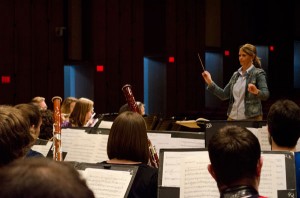I recently wrote a book based on the stories of several first-year teachers — many of whom are graduates of our Ithaca College Department of Music Education. The book is called “The Music Teacher’s First Year: Tales of Challenge, Joy and Triumph.” The idea behind the book came from my dissertation research, which was a case study of three first-year instrumental music teachers — all Ithaca College graduates. I spent the year interviewing them, reading their journal entries, recording their rehearsals. I had a pretty good picture of what their first year was like.
Then, it occurred to me that every March or April, many recent IC grads or first-year teachers will come back to visit us during their spring break. These young teachers are eager to tell us about their experiences, and our undergraduates are eager to hear their stories. I thought this approach — interviews and stories from first-year teachers — would make a great book.

I was able to receive a grant from the college so I could set up a “story booth” at both the New York State School Music Association convention and the Midwest Band and Orchestra Clinic. I interviewed about 40 young music teachers. This book is a collection of 32 of those interviews. From a first-year teacher whose instruments were stolen before entering his building to a teacher who received hate mail before her first day, to a teacher whose sensitivity, flexibility and insight gained her the respect of her ensemble in only weeks, this collection of stories from first-year teachers is a description of their real world. In addition, each chapter includes discussion questions for pre-service teachers as they prepare for their teaching future.
My hope is that first-year or young music teachers will read the book and know that others are right there with them experiencing the same thing. I also hope this book will be used in music education methods courses as the discussion questions at the end of each chapter help to focus the reader on issues and ways to solve problems.
The biggest thing I learned while working on this project is that young music teachers tend to struggle most with the nonmusical aspects of the job, like getting along with others, organization and administration of a music program. It is difficult to teach someone to have interpersonal skills, but those are exactly the skills that young teachers need most.
Below is an excerpt from the book. John was asked if he could identify one aspect of his teaching style that has changed or evolved during his first few years of teaching in New York City. He said:
“That’s hard to explain because it is sort of like watching a tree grow. You know it gets bigger, but it’s your tree, so it is hard to notice. I’ve made many little changes, but one thing: I find I raise my voice less. I’m able to instill discipline more constructively. I’m more in control of myself and my program, and I think that affects the ensembles. I realize that most ensembles are actually a mirror of the director — a direct reflection of someone’s personality and attitude. Your students will behave the way you behave. Your students will value what you value . . .”
John got quiet for a moment. Then he said, as he was still considering the question about his own evolution as a teacher, “That’s a tough question. The greatest thing that I have done in the job is establish the culture of the program.”
Another young teacher concluded in her story: “I love my job. It’s hard, it’s definitely hard, and I’m exhausted every day. But when the kids ‘get it’, it’s entirely worth it. I wouldn’t trade it for the world.”
Beth Peterson is an associate professor of music education. Email her at [email protected].







